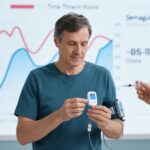Highlights
- Phase 2 trial of M72/AS01E-4 demonstrates robust immunogenicity and acceptable safety in virally suppressed, ART-treated people living with HIV (PLWH).
- Significant and durable antibody and CD4 T-cell responses to M72/AS01E-4 were observed up to one year after vaccination.
- Reactogenicity was higher in the vaccine group but no life-threatening or vaccine-related serious adverse events were reported.
- The data support further clinical development of M72/AS01E-4 as a candidate TB vaccine for the HIV-positive population.
Study Background and Disease Burden
Tuberculosis (TB) remains a leading cause of morbidity and mortality among people living with HIV, particularly in high-prevalence regions such as sub-Saharan Africa. Despite advances in antiretroviral therapy (ART), PLWH are up to 20 times more likely to develop active TB compared with HIV-negative individuals. Current TB prevention strategies, reliant on isoniazid preventive therapy and the century-old Bacillus Calmette–Guérin (BCG) vaccine, provide only partial and inconsistent protection in adults. The development of a novel, effective TB vaccine suitable for immunocompromised populations represents a critical unmet need in global health.
Study Design
This observer-blinded, randomized, placebo-controlled phase 2 trial was conducted in South Africa to assess the safety and immunogenicity of M72/AS01E-4—a recombinant fusion protein vaccine containing Mycobacterium tuberculosis antigens Mtb32A and Mtb39A, adjuvanted with AS01E-4—in adolescents and adults living with HIV. Eligible participants were aged 16-35 years, on stable ART for at least three months, with HIV viral loads below 200 copies/mL and CD4 T-cell counts ≥200 cells/μL.
A total of 401 participants (mean age ~29.5 years, 87% women) were randomized to receive two doses of M72/AS01E-4 or placebo, administered on days 1 and 29. Primary endpoints included solicited adverse events (AEs) within 7 days post-vaccination, unsolicited AEs within 28 days, and serious AEs throughout the study. Immunogenicity was measured by M72-specific IgG concentrations and M72-specific CD4/CD8 T-cell responses at multiple time points up to day 390.
Key Findings
- Safety and Reactogenicity: The vaccine was generally well-tolerated, with vaccine-related AEs occurring in 12% of the M72/AS01E-4 group versus 6% in the placebo group. Most events were mild to moderate injection-site reactions (8% vs 1%). Two severe AEs (dizziness and injection-site erythema) were reported as vaccine-related, but no participants discontinued or died due to AEs. Nine serious AEs occurred (4 in the vaccine group, 5 in placebo), including COVID-19, tibia fracture, spontaneous abortion, and psychotic disorder, none attributed to the vaccine.
- Immunogenicity: M72-specific IgG antibody concentrations in the vaccine group rose from baseline to 13.28 EU/mL by day 29, peaked at 479.70 EU/mL by day 57, and declined to 32.43 EU/mL by day 390—remaining above baseline levels throughout. The placebo group showed no change. CD4 T-cell responses specific to M72, measured by expression of interferon-gamma or interleukin-2, were significantly elevated in the vaccine group compared to placebo at both day 57 and day 390 (P < 0.0001). CD8 T-cell responses were not highlighted as significant.
- Durability: Both antibody and CD4 T-cell responses demonstrated persistence for at least one year, suggesting potential for durable protection.
Expert Commentary
The trial provides robust evidence that the M72/AS01E-4 vaccine can elicit meaningful immune responses in HIV-positive individuals with virologic suppression and preserved CD4 counts. The safety profile, while associated with increased local reactogenicity, was acceptable and consistent with expectations for adjuvanted protein vaccines. Notably, no vaccine-related serious adverse events were identified, addressing concerns that immunocompromised hosts might be at higher risk for complications.
There remain important considerations for interpreting these results:
- The study population was restricted to individuals with relatively preserved immune function (CD4 ≥200 cells/μL and on ART), so findings may not extend to those with advanced immunosuppression or untreated HIV infection.
- This phase 2 trial was not designed to assess vaccine efficacy against clinical TB disease. Ongoing and future efficacy trials in broader HIV-positive populations, including those with latent TB infection, will be critical.
- The predominance of young women in the trial reflects local epidemiology but may impact generalizability to other demographics.
Mechanistically, the strong induction of CD4 T-cell responses aligns with growing evidence that cellular immunity is critical for TB control, especially in the context of HIV. The successful use of a recombinant fusion protein with a potent adjuvant (AS01E-4) may represent a versatile platform for other difficult-to-treat infections in immunosuppressed populations.
Conclusion
The M72/AS01E-4 vaccine candidate shows promise as a safe and immunogenic TB vaccine for virally suppressed, ART-treated HIV-positive adolescents and adults. These findings support progression to larger efficacy trials and highlight the potential for tailored vaccine strategies in populations at highest risk for TB morbidity and mortality. Addressing the unique needs of people living with HIV through novel immunization approaches remains a global health priority, and M72/AS01E-4 is an important step in this direction.
References
Dagnew AF, Han LL, Naidoo K, Fairlie L, Innes JC, Middelkoop K, Tameris M, Wilkinson RJ, Ananworanich J, Bower D, Schlehuber L, Frahm N, Cinar A, Dunne M, Schmidt AC. Safety and immunogenicity of investigational tuberculosis vaccine M72/AS01E-4 in people living with HIV in South Africa: an observer-blinded, randomised, controlled, phase 2 trial. Lancet HIV. 2025 Aug;12(8):e546-e555. doi: 10.1016/S2352-3018(25)00124-9.
World Health Organization. Global tuberculosis report 2023. Geneva: WHO; 2023. [https://www.who.int/teams/global-tuberculosis-programme/tb-reports](https://www.who.int/teams/global-tuberculosis-programme/tb-reports)



